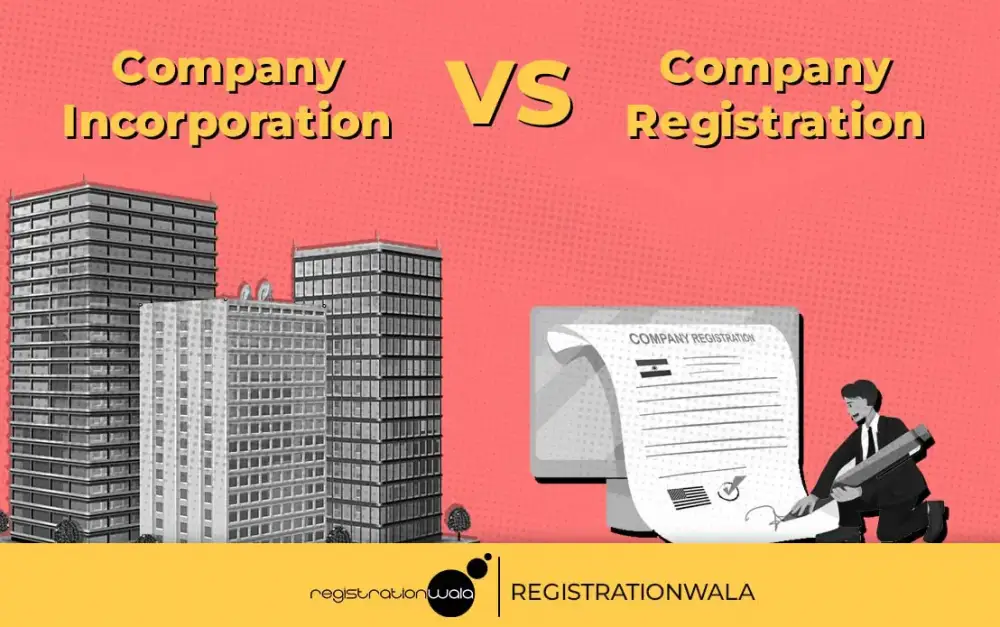Company Incorporation vs. Company Registration
- October 25, 2023
- Registrationwala

- Home
- /
- Knowledge Base
- /
- News & other businesses
- /
- Blog
- /
- Company Incorporation vs. Company Registration
Company Incorporation vs. Company Registration
The company incorporation procedure and provisions related to the company registration certificate are regulated by the Companies Act, 2013. Without the issue of registration certification from the Registrar of Companies (ROC), the company cannot run a business in India.
The certificate will be issued to the company when it complies with the regulations of the Act. However, the compliances are different in both the company registration and company incorporation. The application for registration must sent to the Ministry of Corporate Affairs (MCA) website and fill SPICe+ form for incorporating a company. All the new companies that want to register after February 23rd, 2020 must fill out the SPICe+ form.
What is Company Registration?
Company registration is a process in which you have to register your business with the government authority. So, for registering a company you need to register with the Registrar of Companies also known as ROC. To register a company you have to follow a certain procedure, for instance, filling an application form, attaching documents, paying fees, following up with the authority, etc.
Basically, the process is long and complex, so it is suggested that businesses must consult a professional for company registration. We at Registrationwala, help our clients obtain the company registration license. Registering a company with the government is essential because of the following benefits:
- The company is a separate legal entity from its directors and shareholders. It has its own rights and bears its own liabilities and proceedings.
- Has perpetual succession which means the company’s activities will stop because of the death or departure of any member.
- The company’s debts are limited to the face value that members have purchased. If the members have signed a contract for unlimited liabilities with the company then only the member will have unlimited liability towards the company.
What is Company Incorporation?
Company incorporation means, creating a separate legal entity other than its owners. This means the company will have its own identity through which it can enter into contracts, buy the property and even sue or be sued in its own name. However, this is a more complex process which also requires assistance from professionals.
The process of the corporation includes extra steps such as filing an article of incorporation with the state or the federal government. In this article of incorporation, information regarding the name of the corporation, its purpose, structure, and governance is added. Further, you have to appoint a Board of Directors and issue the shares to the shareholders. The power in the company depends on the number of shares of an individual. The benefits of company incorporation are as follows:
- Protects the personal assets from business entities.
- Helps in the expansion and growth of the larger business.
- Provide benefit in flexible profit distribution.
Difference Between Company Registration and Company Incorporation
The terms company registration and company incorporation are most used interchangeably for registration under the Companies Act, of 2013. But if we only see registration, then it means registering a company with government authority for example: if a company have a GST number then we can say that it is registered with the Department of Goods and Services Tax under GST Laws.
Whereas, incorporation means doing a process through which a company came into existence. Below are some other differences between the new company registration and company incorporation.
- Compliance: A registered business must follow the local, state and federal laws as per the location. However, in incorporation, there are strict regulations and compliance obligations. Regular meetings, record-keeping and having transparent guidelines are important.
- Taxation: The type of business structure such as sole proprietorship, one-person company, LLC, or partnership will impact the structure of the tax and it will transfer to the owner’s tax return. In case of incorporation, the companies are liable to pay corporate income tax and file the tax filings. The dividends and profits of shareholders result in double taxation.
- Types of Entities: For company registration, there are different types of corporations such as one-person company, limited liability partnership, or partnership. Further, it can register as a corporation or an LLP. In the incorporation, it can be either a C corporation or an S corporation.
- Legal Identity: While registering a company it is provided a separate legal from its owners this means it can sign a contract or take responsibility on its behalf. The entity of the company remains separate from the shareholders and this separation protects the assets of shareholders in case there is any lawsuit.
Conclusion
In summary, both SEO and SEM have their unique benefits, and the choice between them should align with your business goals and circumstances. For long-term sustainable growth and cost-efficiency, SEO is the go-to option. However, if you need immediate results, precise targeting, and the ability to adapt quickly to changing conditions, SEM is a valuable tool in your digital marketing arsenal. In many cases, a combination of both strategies can provide the best overall results for businesses seeking to maximize their online visibility and reach their target audience effectively.
People also read: A Comprehensive Guide to Corporate and Social Responsibility (CSR)
- 2355 views
